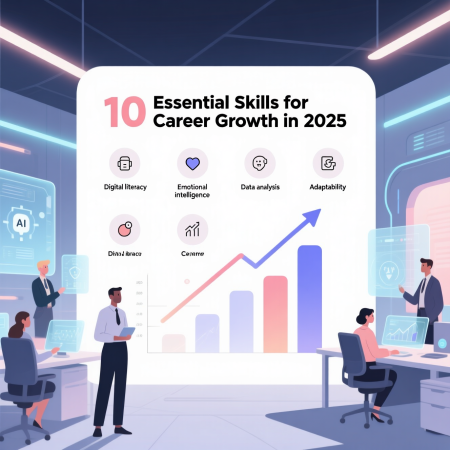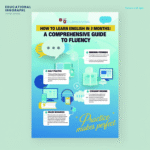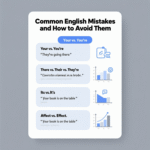In an ever-evolving global economy, staying competitive requires continuous learning and adaptation. The year 2025 promises rapid advancements in technology, shifting workplace dynamics, and increasing demand for specialized skills for career growth. We understand the importance of equipping professionals with the tools to thrive in this dynamic landscape. This comprehensive guide explores 10 must-learn skills for career growth in 2025, offering actionable insights, practical applications, and strategies to help you excel. Whether you’re an aspiring leader, a mid-career professional, or transitioning into a new industry, these skills will position you for long-term success.
- Why Skill Development is Critical for Career Growth in 2025
- 1. Artificial Intelligence and Machine Learning Proficiency
- Understanding AI and ML in 2025
- Why It’s Essential for Career Growth
- How to Learn AI and ML
- Career Opportunities
- 2. Data Analysis and Interpretation
- The Power of Data in Decision-Making
- Why Data Analysis Drives Career Growth
- How to Master Data Analysis
- Career Opportunities
- 3. Cybersecurity Expertise
- The Growing Need for Cybersecurity
- Why Cybersecurity Matters
- How to Build Cybersecurity Skills
- Career Opportunities
- 4. Cloud Computing Expertise
- The Rise of Cloud Technology
- Why Cloud Computing is a Game-Changer
- How to Learn Cloud Computing
- Career Opportunities
- 5. Digital Marketing and SEO
- The Evolution of Digital Marketing
- Why Digital Marketing and SEO Are Vital
- How to Excel in Digital Marketing and SEO
- Career Opportunities
- 6. Emotional Intelligence and Leadership
- The Importance of Emotional Intelligence
- Why EQ Drives Success
- How to Develop Emotional Intelligence
- Career Opportunities
- 7. Blockchain and Decentralized Technologies
- 8. Sustainability and Green Skills
- The Shift Toward Sustainability
- Why Sustainability Matters for Career Growth
- How to Develop Green Skills
- Career Opportunities
- 9. Advanced Communication and Storytelling
- The Art of Effective Communication
- Why Communication Drives Career Growth
- How to Master Communication and Storytelling
- Career Opportunities
- 10. Agile Project Management
- The Rise of Agile Methodologies
- Why Agile is Essential
- How to Learn Agile Project Management
- Career Opportunities
- How to Prioritize and Combine These Skills
- Recommendations and Suggestions
- FAQs
- 1. Why are skills for career growth important in 2025?
- 2. How can I start learning AI and ML?
- 3. What tools are essential for data analysis?
- 4. Is cybersecurity a good career choice in 2025?
- 5. How do I choose the right cloud computing certification?
- 6. Can digital marketing skills benefit non-marketers?
- 7. How does emotional intelligence impact leadership?
- 8. What industries use blockchain technology?
- 9. Why are green skills important in 2025?
- 10. How can storytelling improve my career?
- 11. What is agile project management?
- 12. How long does it take to learn these skills?
- 13. Are certifications necessary for career growth?
- 14. Can I learn these skills without a technical background?
- 15. How do I stay motivated while learning new skills?
Why Skill Development is Critical for Career Growth in 2025
The workplace of 2025 is shaped by technological breakthroughs, hybrid work models, and a focus on sustainability and inclusivity. Automation, artificial intelligence, and globalization are redefining job roles, making adaptability and upskilling non-negotiable. By mastering skills for career growth, you can future-proof your career, increase earning potential, and unlock new opportunities. We’ve curated this list based on emerging trends, industry demands, and expert insights to ensure you’re prepared for the challenges and opportunities of 2025.
1. Artificial Intelligence and Machine Learning Proficiency
Understanding AI and ML in 2025
Artificial intelligence (AI) and machine learning (ML) are no longer futuristic concepts but integral parts of industries like healthcare, finance, marketing, and logistics. By 2025, AI adoption will accelerate, with businesses leveraging predictive analytics, natural language processing, and automation to drive efficiency. Proficiency in AI and ML involves understanding algorithms, data modeling, and deployment of AI-driven solutions.
Why It’s Essential for Career Growth
AI and ML skills are in high demand across roles like data scientists, software engineers, and business analysts. Companies seek professionals who can interpret AI outputs, optimize algorithms, and integrate AI into workflows. Mastering these skills positions you as a valuable asset in tech-driven industries.
How to Learn AI and ML
-
Enroll in Online Courses: Platforms like Coursera, edX, and Udacity offer beginner-to-advanced AI and ML programs, such as Stanford’s AI Professional Certificate or Google’s TensorFlow Developer Certificate.
-
Practice with Tools: Gain hands-on experience with Python, TensorFlow, PyTorch, and scikit-learn through projects on Kaggle or GitHub.
-
Join AI Communities: Engage with forums like Reddit’s r/MachineLearning or attend AI conferences to stay updated on trends.
-
Work on Real-World Projects: Build AI models for tasks like image recognition or sentiment analysis to showcase practical expertise.
Career Opportunities
AI and ML proficiency opens doors to roles like AI engineer, data scientist, or AI product manager, with salaries often exceeding $120,000 annually, depending on experience and location.
2. Data Analysis and Interpretation
The Power of Data in Decision-Making
Data is the backbone of modern businesses. In 2025, organizations will rely heavily on data-driven insights to optimize operations, enhance customer experiences, and predict market trends. Data analysis involves collecting, cleaning, and interpreting data to inform strategic decisions.
Why Data Analysis Drives Career Growth
Professionals skilled in data analysis can identify patterns, forecast outcomes, and provide actionable recommendations. This skill is critical in industries like e-commerce, finance, and healthcare, where data informs everything from marketing campaigns to patient outcomes.
How to Master Data Analysis
-
Learn Key Tools: Familiarize yourself with tools like Excel, SQL, Tableau, and Power BI for data manipulation and visualization.
-
Understand Statistical Methods: Study concepts like regression analysis, hypothesis testing, and probability to interpret data accurately.
-
Take Online Courses: Platforms like DataCamp and LinkedIn Learning offer courses on data analysis and visualization.
-
Build a Portfolio: Create case studies showcasing your ability to analyze datasets and present findings.
Career Opportunities
Data analysts, business intelligence analysts, and data engineers are in high demand, with average salaries ranging from $80,000 to $110,000 annually.
3. Cybersecurity Expertise
The Growing Need for Cybersecurity
As digital transformation accelerates, cybersecurity threats like ransomware, phishing, and data breaches are on the rise. By 2025, organizations will prioritize securing their digital assets, making cybersecurity expertise a top skill for career growth.
Why Cybersecurity Matters
Cybersecurity professionals protect sensitive data, ensure compliance with regulations like GDPR, and mitigate risks. This skill is critical for roles in IT, finance, and government sectors, where data security is paramount.
How to Build Cybersecurity Skills
-
Earn Certifications: Pursue credentials like CompTIA Security+, Certified Ethical Hacker (CEH), or Certified Information Systems Security Professional (CISSP).
-
Learn Key Concepts: Study network security, encryption, penetration testing, and incident response.
-
Practice in Simulated Environments: Use platforms like TryHackMe or Hack The Box to simulate real-world cyber threats.
-
Stay Updated: Follow cybersecurity blogs like Krebs on Security and attend webinars to keep pace with evolving threats.
Career Opportunities
Cybersecurity analysts, ethical hackers, and information security managers enjoy robust job prospects, with salaries often exceeding $100,000 annually.
4. Cloud Computing Expertise
The Rise of Cloud Technology
Cloud computing is the foundation of modern IT infrastructure, enabling businesses to scale, reduce costs, and enhance flexibility. By 2025, cloud adoption will expand, with platforms like AWS, Microsoft Azure, and Google Cloud dominating the market.
Why Cloud Computing is a Game-Changer
Professionals skilled in cloud computing can design, deploy, and manage cloud-based solutions, making them indispensable in tech-driven organizations. This skill is critical for roles in DevOps, cloud architecture, and IT management.
How to Learn Cloud Computing
-
Certifications: Obtain credentials like AWS Certified Solutions Architect, Microsoft Azure Fundamentals, or Google Cloud Professional Cloud Architect.
-
Hands-On Practice: Use free tiers of cloud platforms to build and deploy applications.
-
Learn Related Technologies: Study containerization tools like Docker and Kubernetes for advanced cloud management.
-
Join Cloud Communities: Participate in forums like AWS Developer Forums or Cloud Native Computing Foundation events.
Career Opportunities
Cloud engineers, DevOps specialists, and cloud architects are highly sought after, with salaries ranging from $90,000 to $140,000 annually.
5. Digital Marketing and SEO
The Evolution of Digital Marketing
In 2025, digital marketing will evolve with AI-driven advertising, personalized content, and advanced analytics. Search engine optimization (SEO) remains a cornerstone, helping businesses rank higher on Google and attract organic traffic.
Why Digital Marketing and SEO Are Vital
Mastering digital marketing and SEO allows you to drive brand visibility, engage audiences, and boost conversions. These skills are essential for roles in marketing, content creation, and e-commerce.
How to Excel in Digital Marketing and SEO
-
Learn SEO Best Practices: Study on-page and off-page SEO, keyword research, and link-building strategies.
-
Master Tools: Use tools like Google Analytics, SEMrush, Ahrefs, and Moz for performance tracking and optimization.
-
Stay Updated: Follow blogs like Search Engine Journal and Moz Blog for the latest SEO trends.
-
Experiment with Campaigns: Run small-scale ad campaigns on Google Ads or social media to gain practical experience.
Career Opportunities
Digital marketers, SEO specialists, and content strategists can earn $70,000 to $100,000 annually, with opportunities in agencies and corporate settings.
6. Emotional Intelligence and Leadership
The Importance of Emotional Intelligence
Emotional intelligence (EQ) involves understanding and managing emotions to build strong relationships and lead effectively. In 2025, EQ will be a critical skill for career growth, especially for leadership roles in hybrid and remote work environments.
Why EQ Drives Success
Leaders with high EQ foster collaboration, resolve conflicts, and inspire teams. This skill is essential for managers, HR professionals, and team leads across industries.
How to Develop Emotional Intelligence
-
Practice Self-Awareness: Reflect on your emotions and triggers through journaling or mindfulness.
-
Improve Communication: Hone active listening and empathy in professional interactions.
-
Take Leadership Courses: Platforms like LinkedIn Learning offer courses on EQ and leadership.
-
Seek Feedback: Regularly ask for feedback from colleagues to identify areas for improvement.
Career Opportunities
Professionals with strong EQ excel in roles like project manager, HR specialist, and executive leadership, with salaries ranging from $80,000 to $150,000 annually.
7. Blockchain and Decentralized Technologies
The Rise of Blockchain
Blockchain technology extends beyond cryptocurrencies, impacting industries like supply chain, finance, and healthcare. By 2025, blockchain adoption will grow, creating demand for professionals skilled in decentralized systems.
Why Blockchain is a Top Skill
Blockchain expertise enables you to develop secure, transparent systems for transactions and data management. This skill is critical for roles in fintech, cybersecurity, and logistics.
How to Learn Blockchain
-
Study Core Concepts: Understand distributed ledgers, smart contracts, and consensus algorithms.
-
Learn Programming: Master languages like Solidity for Ethereum-based development.
-
Take Courses: Enroll in blockchain courses on platforms like Coursera or Udemy.
-
Build Projects: Create decentralized applications (dApps) or contribute to open-source blockchain projects.
Career Opportunities
Blockchain developers, smart contract engineers, and crypto analysts can earn $100,000 to $150,000 annually.
8. Sustainability and Green Skills
The Shift Toward Sustainability
Sustainability is a global priority in 2025, with businesses adopting eco-friendly practices to meet regulatory and consumer demands. Green skills involve designing and implementing sustainable solutions across industries.
Why Sustainability Matters for Career Growth
Professionals with green skills can drive corporate social responsibility, reduce environmental impact, and align with global sustainability goals. This skill is vital in sectors like energy, manufacturing, and urban planning.
How to Develop Green Skills
-
Learn Sustainability Frameworks: Study frameworks like ESG (Environmental, Social, Governance) and circular economy principles.
-
Earn Certifications: Pursue credentials like LEED Green Associate or Certified Sustainability Professional.
-
Engage in Projects: Work on initiatives like carbon footprint reduction or renewable energy adoption.
-
Stay Informed: Follow organizations like the UN Environment Programme for industry updates.
Career Opportunities
Sustainability consultants, environmental analysts, and green project managers are in demand, with salaries ranging from $70,000 to $120,000 annually.
9. Advanced Communication and Storytelling
The Art of Effective Communication
In 2025, the ability to communicate ideas clearly and persuasively will remain a cornerstone of professional success. Storytelling, in particular, is a powerful tool for engaging audiences and conveying complex ideas.
Why Communication Drives Career Growth
Strong communicators excel in roles requiring presentations, negotiations, or content creation. Storytelling enhances marketing, leadership, and customer engagement.
How to Master Communication and Storytelling
-
Practice Public Speaking: Join organizations like Toastmasters to refine presentation skills.
-
Learn Storytelling Frameworks: Study narrative structures like the Hero’s Journey for compelling content.
-
Take Writing Courses: Platforms like MasterClass offer courses on persuasive writing and storytelling.
-
Analyze Successful Campaigns: Study viral marketing campaigns to understand effective storytelling.
Career Opportunities
Content creators, corporate trainers, and marketing managers with strong communication skills can earn $60,000 to $100,000 annually.
10. Agile Project Management
The Rise of Agile Methodologies
Agile project management, rooted in flexibility and collaboration, is a standard in industries like tech, marketing, and product development. By 2025, agile skills will be critical for managing complex projects efficiently.
Why Agile is Essential
Agile professionals can lead cross-functional teams, adapt to changing priorities, and deliver projects on time. This skill is vital for roles in project management, software development, and consulting.
How to Learn Agile Project Management
-
Earn Certifications: Pursue credentials like Certified ScrumMaster (CSM) or PMI Agile Certified Practitioner (PMI-ACP).
-
Learn Agile Tools: Master tools like Jira, Trello, and Asana for project tracking.
-
Practice Agile Principles: Implement Scrum or Kanban methodologies in small-scale projects.
-
Join Agile Communities: Engage with groups like the Agile Alliance for networking and learning.
Career Opportunities
Agile project managers, Scrum masters, and product owners can earn $90,000 to $130,000 annually.
How to Prioritize and Combine These Skills
Mastering all 10 skills for career growth may seem daunting, but strategic prioritization can maximize your impact. Start with skills aligned with your industry or role, such as AI for tech professionals or digital marketing for creatives. Combine complementary skills, like data analysis and cloud computing, to enhance versatility. Dedicate time weekly to learning through courses, projects, and networking to stay competitive.
Recommendations and Suggestions
To succeed in 2025, we recommend:
-
Create a Learning Plan: Set specific goals for each skill, such as earning one certification per quarter.
-
Leverage Online Resources: Use platforms like Coursera, Udemy, and LinkedIn Learning for structured learning.
-
Build a Portfolio: Showcase projects on GitHub, Behance, or personal websites to demonstrate expertise.
-
Network Strategically: Attend industry conferences, webinars, and LinkedIn groups to connect with professionals.
-
Stay Adaptable: Monitor industry trends to pivot your skillset as needed.
FAQs
1. Why are skills for career growth important in 2025?
Skills for career growth ensure professionals remain competitive in a rapidly changing job market driven by technology and globalization.
2. How can I start learning AI and ML?
Begin with beginner-friendly courses on Coursera or Udacity, practice with Python and TensorFlow, and join AI communities for support.
3. What tools are essential for data analysis?
Key tools include Excel, SQL, Tableau, and Power BI for data manipulation, visualization, and reporting.
4. Is cybersecurity a good career choice in 2025?
Yes, cybersecurity is in high demand due to increasing cyber threats, offering lucrative roles like ethical hacker and security analyst.
5. How do I choose the right cloud computing certification?
Select certifications based on your industry, such as AWS for tech or Azure for enterprise environments.
6. Can digital marketing skills benefit non-marketers?
Yes, digital marketing skills like SEO and content creation are valuable for entrepreneurs, freelancers, and content creators.
7. How does emotional intelligence impact leadership?
High EQ enhances team collaboration, conflict resolution, and employee engagement, critical for effective leadership.
8. What industries use blockchain technology?
Blockchain is used in finance, supply chain, healthcare, and logistics for secure, transparent transactions.
9. Why are green skills important in 2025?
Green skills align with global sustainability goals, making them essential for roles in energy, manufacturing, and urban planning.
10. How can storytelling improve my career?
Storytelling enhances communication, making you more persuasive in marketing, leadership, and client interactions.
11. What is agile project management?
Agile is a flexible project management approach using methodologies like Scrum and Kanban to deliver projects efficiently.
12. How long does it take to learn these skills?
Learning times vary, but most skills can be developed in 3-6 months with consistent effort and practice.
13. Are certifications necessary for career growth?
Certifications validate skills and enhance employability, but practical experience and portfolios are equally important.
14. Can I learn these skills without a technical background?
Yes, many skills, like digital marketing and EQ, are accessible to non-technical professionals with the right resources.
15. How do I stay motivated while learning new skills?
Set clear goals, track progress, and join communities for accountability and inspiration.











